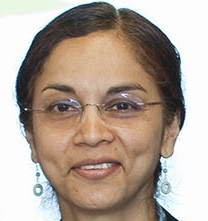
Watch Dr Parvathi Menon accept her research grant and hear a bit about the project.
PROJECT SUMMARY:
Amyotrophic Lateral sclerosis (ALS) is a progressive, eventually fatal disease of the human motor system. The commonest variant of the disease is rapidly progressive with average survival of 3-5 years after diagnosis. Research undertaken by me and other members of my group has shown that a brain functional change called hyperexcitability is an early and reliable diagnostic marker of ALS.
My next study was aimed at assessing regional differences in brain hyperexcitability which may underlie spread of physical symptoms in affected patients. There was evidence of hyperexcitability being greater over muscle worse affected in ALS, of hyperexcitability being greater over the controlling brain hemisphere in patients with onset of muscle weakness on one side of the body.
A striking finding in the above studies was the early occurrence of hyperexcitability throughout the brain in ALS despite predominance over selective muscles and brain hemispheres. Further, body regions supposedly less dexterous in their movement and considered to have less dense brain connections seem to develop the phenomenon of inexcitability quite early in ALS.
These findings led us to consider other modalities of assessing changes in brain function in ALS. One of the approaches we have used is of MRI studies of the brain with analysis of a unique aspect of brain function which is the connectivity between regions and the formation of so called functional and resting networks. Our early MRI studies have shown increase in inter-regional connectivity in patients with ALS which correlates with brain hyperexcitability.
A new technique we are using to understand brain connectivity is the technique of TMS EEG. With this multimodal approach I, along with colleagues, hope to closely observe and study ALS patients using clinical and standard testing techniques complemented by the multimodality research tools to provide a clearer understanding of the brain changes driving ALS.


 The Brain Foundation is the largest, independent funder of brain and spinal injury research in Australia. We believe research is the pathway to recovery.
The Brain Foundation is the largest, independent funder of brain and spinal injury research in Australia. We believe research is the pathway to recovery.